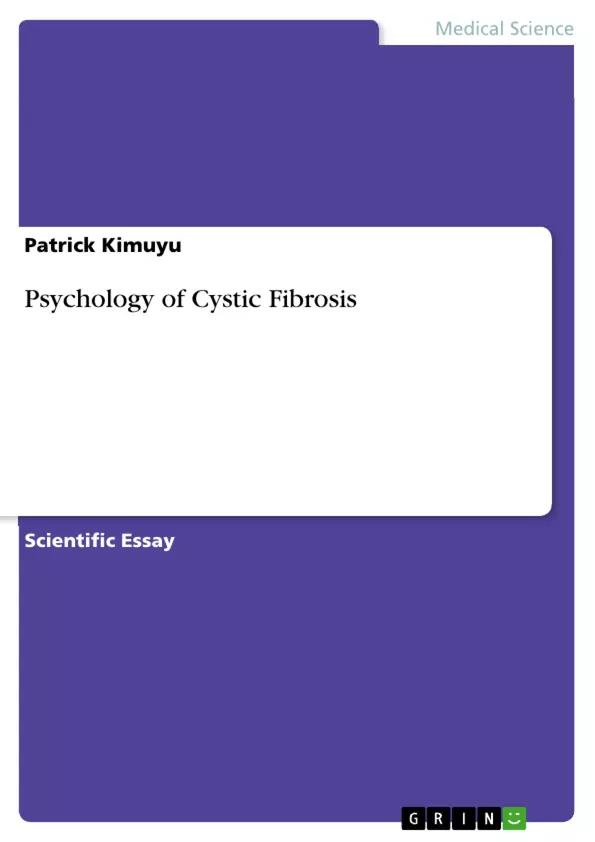Scientists define cystic fibrosis (CF) as an autosomal recessive genetic disorder affecting lungs, but can also progress to intestine, pancreas and liver. Since the disorder mostly affects lungs, the affected patients have difficulties in breathing. The disorder affects more than 30,000 people in the United States. In 2011, 309 people suffered from cystic fibrosis in Western Australia. The median age of death for people suffering from CF was reported as 27 years. 60% of CF deaths are attributed to pulmonary complications. However, CF patients can live more than forty years with proper care and medication.
According to the Department of Health, Western Australia, more adult people suffered from CF compared to children in western Australian in the 2010. Scientists believe that CF is caused by many gene mutations for the protein cystic fibrosis transmembrane conductance regulator (CFTR). Precisely, this protein is essential in regulating components of digestive fluids, mucus and sweat. Majority of health people have two copies of the CFTR gene while carriers have only one working copy. Evidently, people suffering from the CF have no working copy of CFTR gene. The disorder is associated with many gastrointestinal complications which, include biliary cirrhosis, intestine obstruction and bile duct proliferation.
Inhaltsverzeichnis (Table of Contents)
- Psychology of Cystic Fibrosis
- Developmental Psychology and Cystic Fibrosis
- Impact of Cystic Fibrosis on Development
- Psychosocial Issues in Cystic Fibrosis
- Treatment and Management of Cystic Fibrosis
- Conclusion
Zielsetzung und Themenschwerpunkte (Objectives and Key Themes)
This document explores the psychological impact of cystic fibrosis (CF) on individuals throughout their development. It examines how CF affects different stages of psychosocial development, including the challenges and adaptations faced by individuals and families.
- The influence of cystic fibrosis on various stages of psychosocial development
- The impact of CF on parent-child relationships and attachment
- The emotional and psychological challenges faced by individuals with CF
- The role of family support and psychosocial interventions in managing CF
- The potential for improving the quality of life for individuals with CF
Zusammenfassung der Kapitel (Chapter Summaries)
- Psychology of Cystic Fibrosis: This chapter provides a general overview of cystic fibrosis, its genetic basis, and the various symptoms and complications that can arise. It also highlights the importance of early diagnosis and the impact of CF on the physical health of individuals.
- Developmental Psychology and Cystic Fibrosis: This chapter explores the theoretical frameworks of developmental psychology, particularly Erikson's stages of psychosocial development. It examines how these stages apply to the unique challenges faced by individuals with CF.
- Impact of Cystic Fibrosis on Development: This chapter examines the specific ways in which CF can impact different stages of development, from infancy to adolescence. It focuses on the challenges related to trust, autonomy, initiative, identity, and intimacy.
- Psychosocial Issues in Cystic Fibrosis: This chapter delves into the psychosocial issues that individuals with CF may face, including body image concerns, social isolation, and emotional distress. It also discusses the role of family support and the importance of addressing these challenges.
- Treatment and Management of Cystic Fibrosis: This chapter examines the various treatment options available for CF, including medication, physiotherapy, and nutritional support. It emphasizes the importance of a comprehensive approach to managing the disease and improving the quality of life for individuals with CF.
Schlüsselwörter (Keywords)
Cystic fibrosis, developmental psychology, psychosocial development, attachment, family support, emotional distress, body image, social isolation, treatment, management.
Frequently Asked Questions
What is Cystic Fibrosis (CF) and how is it caused?
CF is an autosomal recessive genetic disorder caused by mutations in the CFTR gene, which affects the regulation of mucus, sweat, and digestive fluids.
How does CF affect psychological development?
The disorder impacts various stages of psychosocial development, presenting unique challenges regarding trust, autonomy, identity, and intimacy, as outlined in Erikson's developmental stages.
What are the common psychosocial issues faced by CF patients?
Patients often deal with emotional distress, body image concerns, social isolation, and the psychological burden of a chronic, life-limiting illness.
What is the life expectancy for individuals with Cystic Fibrosis?
While the median age of death has historically been reported around 27 years, proper care and modern medication allow many patients to live well into their 40s.
How important is family support in managing CF?
Family support and psychosocial interventions are crucial for managing the disease and improving the quality of life for individuals throughout their development.
- Arbeit zitieren
- Patrick Kimuyu (Autor:in), 2016, Psychology of Cystic Fibrosis, München, GRIN Verlag, https://www.grin.com/document/381312



